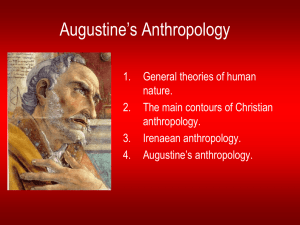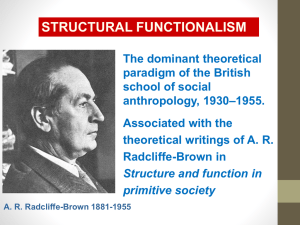American Anthropology
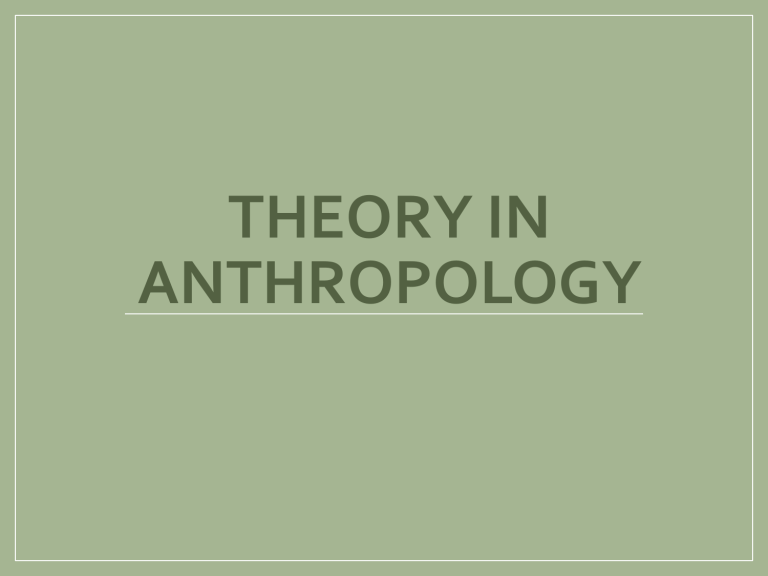
THEORY IN
ANTHROPOLOGY
Learning Objectives
1)
2)
3)
4)
5)
Develop a timeline for anthropological theory
Recognize the early influence of European scholars on
American anthropological theory
Discriminate between the various anthropological theoretical schools of thought
Explain the main contributes of each scholar to anthropological theory
Distinguish between early ideas of cultural and biological variation and current understanding of such processes.
Unlinear Evolutionism
• ‘Armchair’ Anthropologists
• [Note: As emphasis on scientific methodology grew, both methods and ‘theories’ were challenged]
Unlinear Evolutionism
• Result of ‘Armchair’ Anthropology = Unilinear Evolutionism
• All human ways of life pass through a ___________
________________________________________
• Cultures evolve in a _______________________________
• Cultural traits have a ______________________
Unlinear Evolutionism
• Louis Henjry Morgan
• _____________ development, with subdivisions:
_____________ ____________ _________
• Problem(s) with Morgan’s scheme
• _______________________________
Unlinear Evolutionism
• E. B. Tylor
• Anthropology of ____________
_________ __________ _________ _________
• Different starting points & speeds along the unilinear continuum
• Viewed some cultures as _________________
• Checkpoint: What does ‘living fossils’ mean?
Unlinear Evolutionism
• Negative
Unilineal Evolutionism Summary
• Positive
Historical Particularism
• Emphasized that each culture has its own unique
_______________
• Cultures should be understood based __________
____________________________________
• Methods of cultural analysis = _________________
• Rejected _________________
Historical Particularism
• Franz Boas (Father of American Anthropology)
• Cultures may take ___________________
• Cultural histories are __________________
• Emphasized ______________
• Checkpoint: How is diffusion defined in cultural anthropology?
• ___________________________________
• Example: Subsistence practice
Historical Particularism
Historical Particularism Summary
• Positive
• Negative
Functionalism
• Emphasizes the role (function) of________________
• Challenged both ______________________________
• Important scholars:
• Malinowski (Father of Ethnography)
• Radcliffe-Brown
Functionalism
• Malinowski, a Functionalist because of:
• All customs & institutions were ____________________
• If one changed, ____________________
• Each were therefore a ____________________
• ‘Needs Functionalism’
• Cultural customs are developed to_______________
Structural Functionalism
• Radcliffe-Brown
• Role that ____________ play in the life of societies today
• Theoretical category of Structural Functionalism
• Culture & cultural practices _________________
• maintained by the ____________________________
• Social systems similar to _______________________
Functionalism
• Functionalism – Still Present in Anthropology
• Despite challenges to the general theme, a form of functionalism is still a very active perspective in anthropology
Configurationalism
• Culture viewed as _____________________
• Pulled from both ____________________________
• Diffusion is ______________________
• _____________ barriers and/or _____ barriers
• Considered to be part of psychological anthropology
• Scholars: Ruth Benedict and Margaret Mead
Configurationalism
• Benedict
• Believed that each culture is ______________________
• “made over into consistent patterns in accordance with unconscious cannons of choice that develop within a culture,” (Benedict, 1961, p.34)
• Illustrated her point through studying the ____________
Configurationalism
• Mead
• Viewed human nature as a ________________
• Focused on relationship between ___________
• Studied ____________________________
• Coming of Age in Samoa (1928) – pioneering fieldwork, ‘classic’ anthropological text
Neoevolutionism
• Leslie White & Julian Steward – American Anthropologists
• Renewed interest in cultural change & evolution after WWII
• Theoretical school of thought: Neoevolutionism
Neoevolutionism
• Leslie White
• Foundation of __________________________________
• ___________= unit of measurement & cause of cultural change
• Rejected ___________________
Cultural Ecology &
Neoevolutionism
• Julian Steward
• Environmental Influence:
• Cultures in ___________________ would tend to follow the same developmental
______________________________to their
____________________________
• _____________influence ______________
Cultural Materialism
• Marvin Harris
• Proposed Cultural Materialism:
• __________________________________
• All societies have __________________
• Reinforced anthropology as a science
Symbolic Anthropology
• Study of symbols in their ___________________
• Victor Turner –
• Mary Douglas –
Structuralism
• Levi-Strauss
• ____________________underlie all human activity, giving shape to seemingly
_________________________
• Used ____________ to emphasis his point
• Underlying ___________________
When we get to Globalization…
We will cover:
• Processual Approches
• World System Theory
• Political Economy
Anthropology Today
• Increase specialization
• Specializations of Cultural Anthropology:
Economic
Anthropology
Anthropology of Migration
Anthropology of Religion
Educational
Anthropology
Urban
Anthropology
Medical
Anthropology
Psychological
Anthropology
• Four-field approach continues to be present among
Anthropologists
Summary
• Become comfortable with:
• Scholars outlined on previous slide
• Theoretical school of thought
• Main contribution
• Example: Leslie White’s idea that energy capture propelled cultures forward & his rejection of unilinear evolutionism
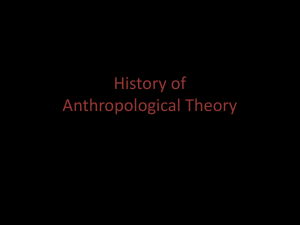
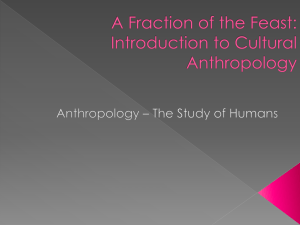
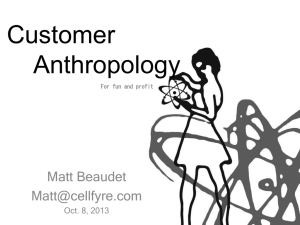
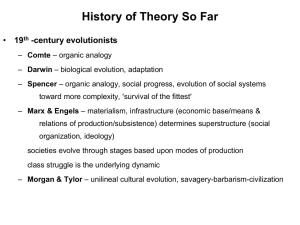
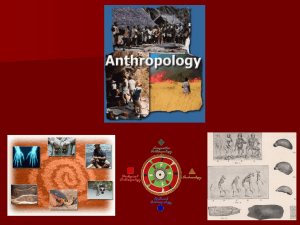
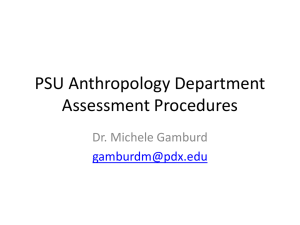
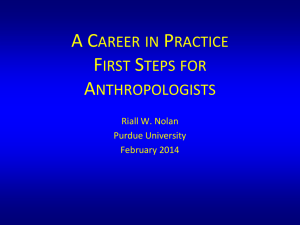
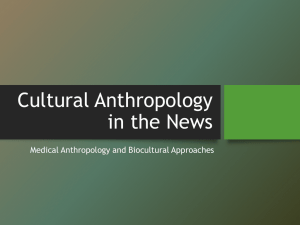
![4[1]._a_man_as_a_person](http://s2.studylib.net/store/data/005226893_1-b67b2be2c3623c1c44b6baa80b997c62-300x300.png)
